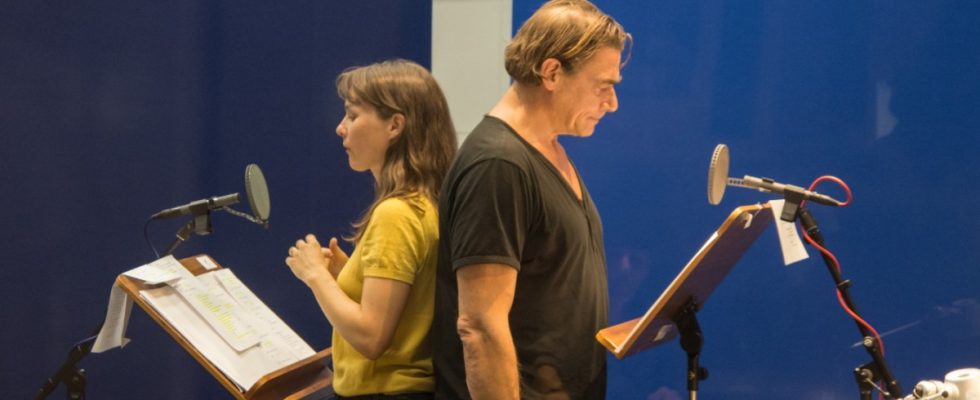“Gray, wet, cloudy.” The first words of “Simeliberg” already create that special atmosphere, a mixture of dark Alpine crime and powerful language that characterizes Michael Fehr’s novel, which was first published in 2015. The impression is made even stronger when you recite the beginning as deliberately slowly and monotonously as Fehr himself does as the famous narrator in the radio play adaptation of the same name, which Bayerischer Rundfunk produced together with Radio Bremen two years after the book was published.
Now the award-winning radio play, directed by Kai Grehn, has been published together with the novel, which has been republished as a paperback, as a total work of art in “The Healthy People Shipping”: Both works stand on their own as well as complement each other. The small Lucerne-based publishing house specializes in spoken word, which is why it is only logical that all of the Swiss writer Fehr’s works – in addition to “Simeliberg”, so far include a drama, a music album and several volumes of short stories – are published here.
Griese is a repeat of Kafka’s characters. Except he’s carrying a loaded gun
Michael Fehr, born in 1982 and raised in Gümligen near Bern, is not only an author, but also a musician and performer. All of his works are written based on the spoken word and are therefore sound art. In “Simeliberg” the protagonists don’t wade through the mud, which is plentiful here, but rather they “plod”. If someone takes an unsteady step, he doesn’t waver, but rather “sways”. Both words are from the deep 19th century and can be found in the German dictionary of the Brothers Grimm. Jacob and Wilhelm Grimm also wrote the fairy tale “Simeliberg” about two unequal brothers, one poor and righteous, the other rich and greedy, which Fehr probably served as a foil for his story.
Added to this is the playful use of idioms, verbal injuries and, at least to local ears, unusual-sounding Helvetisms such as “halbbatzig” for bungling and “Beschützloch” for cesspit. Fehr has a congenital visual impairment, which is why he speaks all of his texts out loud into a Dictaphone before they are written down on the PC. The typeface of “Simeliberg” is therefore more reminiscent of a long poem than a prose text.
The focus is on the community administrator Anatol Griese, who is commissioned to pick up the old farmer Schwarz in order to hand him over to the Swiss social welfare authority. Something doesn’t seem right with the oddball woodsman. On the one hand, he constantly raves about the fact that humans will populate Mars within this century. On the other hand, he has a chunk of money of unknown origin. Most recently, his wife is missing. But nobody knows what happened to her.
So Griese steers his Land Rover from the bright mountain, where the residents have names like Weiss and Wyss, down to Schwarz’s isolated farmhouse. It is said that it is “squatting down in the swamp”, that it is a “shithole”, that it is a “displacement and toilet”. A downward slide in both a literal and figurative sense, in the course of which Griese becomes more and more “involved” in the story until there seems to be no escape for him. Griese, a revenant of Kafka’s characters. Except he’s carrying a loaded gun.
The ninety-minute radio play by Kai Grehn never leaves any doubts about the case of its main character. Simply because the name Griese is always pronounced with a hard K like crisis. Martin Feifel, who knows how to make a character seem both thin-skinned and harsh like few other actors, is this grumpy character.
Michael Fehr: Simeliberg. Paperback including radio play. The Healthy People Dispatch, Lucerne 2023. 144 pages including download code for the radio play, 19.50 CHF.
(Photo: The Healthy People Dispatch)
His Griese has no chance against the rural stoicism of a black man spoken by Heinz-Josef Braun. Although he is the only one who senses the farmer’s seductive qualities, as the son of a German father in the archaic world of the Swiss mountains, he remains an outsider who is not listened to. Just “a shit”. Where the authorities only want to see a funny, twisted “space euphoria” from Schwarz, he sees through the ultranationalist slogans with which Schwarz entraps young men until they want to establish “a new order of strong people.” Ideology plus esotericism plus weapons: Fehr’s sometimes highly explosive text is more explosive today than it was when it was published.
Kai Grehn always approaches the content of his demanding adaptations through music. This is what he did in his younger radio plays with the electronic duo Tarwater (“Burroughs – The Cat Inside”) and the Americans CocoRosie worked together (“Do you like Emily Dickinson?”). For “Simeliberg” he had the German a cappella trio Mom’s children fetched. This varies what is perhaps the oldest Swiss folk song “Vreneli ab em Guggisberg” in ever new and most wondrous ways, giving the mysterious story its very own rhythm.

